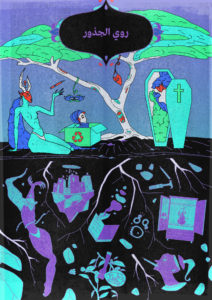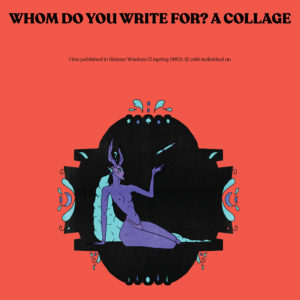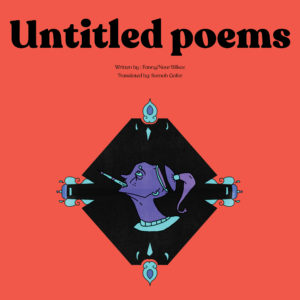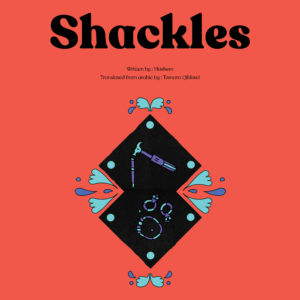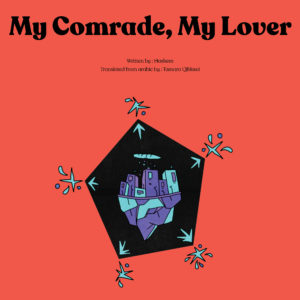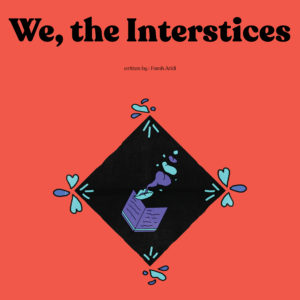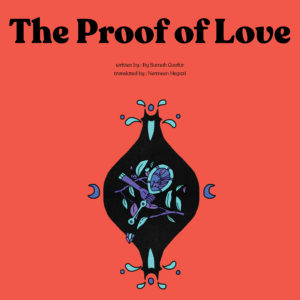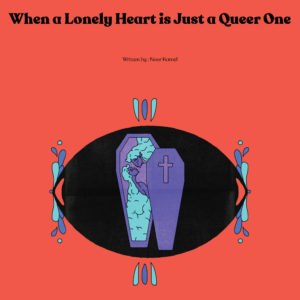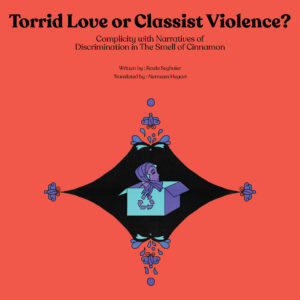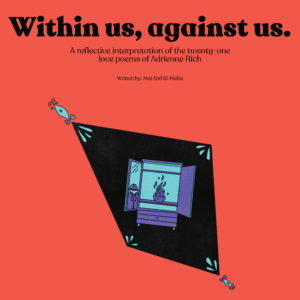
Within us, against us PDF
Written by: Mai Abd El-Hafez
Mai is an African feminist, passionate about spicy food and cats, and dislike writing a Bio about herself
No one has imagined us. We want to live like trees,
sycamores blazing through the sulfuric air,
dappled with scars, still exuberantly budding,
our animal passion rooted in the city.
Every queer love story is inherently doomed; this is what we are taught. Every queer life is doomed, destined to remain in the shadows where nothing grows, to eventually disappear leaving no trace of our own history, queer kins, elders, or stories of life lived with multiple complexities.
The end of the now and here was following us as we walked the dark streets of Cairo late at night, like Adrienne and her partner. Two small young bodies maneuvering the garbage, danger, and uneven pavement in a city that we’ve come to hate and love. Two young lovers concealing their femininity in similarly oversized hoodies. My bag contained Adrienne Rich’s book, ‘The Dream of a Common Language’. I’ve come to know Adrienne through her essays as a lesbian feminist writer, which led me to her poetry. I was mesmerized, devouring every word as if spoken to me and by me through time and space. One of the works among the pages of the book is twenty-one love poems — a collection of sonnets following a relationship like the one I came to find myself walking into. We paced the streets of Cairo, late at night, talking about a mutual love of literature, daring for the first time in our young lives to dream of a better future here, not somewhere else
The world is changing, shifting, and maybe, just maybe, we could then imagine a love like ours moving in the sun.
I wake up in your bed. I know I have been dreaming.
Much earlier, the alarm broke us from each other,
you’ve been at your desk for hours. I know what I dreamed:
our friend the poet comes into my room
where I’ve been writing for days,
drafts, carbons, poems are scattered everywhere,
and I want to show her one poem
which is the poem of my life. But I hesitate,
and wake. You’ve kissed my hair
to wake me. I dreamed you were a poem,
I say, a poem I wanted to show someone
Non-queers love to ask, ‘when did you know?’ As if ‘knowing’ meant allowing ourselves to imagine a life, a future, a love, an acceptance. To know, we need to be able to imagine this sexuality, this feeling, and this desire in a city that won’t allow it, not even in words.
I never dared to dream of poetry that would talk about us — not as fantasy, not as sub-text; poetry that was integrated in our ordinary, everyday lives. Messy rooms and alarms reminding us to collect ourselves back into the closet.
Armed with new words, my goal changed from just existing or barely surviving, to following the trail in history looking for our roots. I searched between the lines of books written in my own language for similar experiences, refraining from the assumption that they didn’t exist before us, that they didn’t leave a history. For us lonely queers out there, to imagine a future we need proof of past resistance.
Poetry was never a central part of my library. My library was mostly fiction, where I’d be the many lives and protagonists of the writer’s mind, and nonfiction, where our lives would be mere theories. While reading Adrienne, I realized that I actually loved poetry but felt betrayed by it. And even when I’d come across a poem where queer women’s desires and love were present, they’d be masked by a metaphoric image or vague sub-text, or viewed from the gaze of men spying on our lives through voyeuristic keyholes.
Do whatever you can to survive.
You know, I think men love wars . . .
And my incurable anger, my unmendable wounds
break open further with tears, I am crying helplessly,
and they still control the world, and you are not in my arms
Gradually, our daily late-night walks became shorter. Our feet were already exhausted, protesting the effort of long daytime marches led by our collective hope, anger, and heartbreak. The book of poems was left behind on the bed we shared. I couldn’t risk losing it during the long shifts of standing alongside the women and men volunteering to come together and counter mass sexual assaults — in response to the initial shock of finding out women were raped and attacked in a place that demanded freedom.
Women among the crowds were betrayed by their ostensible femininity into the hands of mobs, enforcing the reality that was once dismissed in the modest hope that equality somehow applied to our femininity, that calls for freedom and security included us. While fighting back those vicious attacks, Adrienne would repeatedly visit me, reminding me of the beauty of love until the next call for help , as I ignored the intruders’ fingers sneaking their way into the most intimate of spaces and erasing the loving touch of ecstasy from the night before.
I covered the screaming girl’s body. I can’t recall anything but her screams and the complete lack of air. I tried to cover her without touching her. If she knew who I really was, if she saw in those hands embracing her the many other women embracing me back, would she pull away in disgust and horror? Would our shared femininity absolve me in her eyes? Those questions were left unanswered.
I wished for Adrienne to have been there with me so I could ask her, ‘How did you manage to survive all of those years without being consumed by bitterness?’ But she left us in 2012. I wished I were somewhere else, in our bed, reading, escaping this reality. I wanted my home.
centuries of books unwritten piled behind these shelves;
and we still have to stare into absence
of men who would not, women who could not, speak
to our life—this still unexcavated hole
called civilization, this act of translation, this half-world.
The library has been my home since I was nine, reading the words of Oliver Twist asking for more soup. I learned to ask more of words and less of life.
Words were my shield against the adults trying to mold me into the box of what a ‘good girl’ should be. A good girl doesn’t read as much, maybe just enough to receive the kind of education that would lead to a career, and certainly not one that would lead her to question the world she lived in. or as my mother used to say “Indulging into words and literature will ruin you!”
Queer women don’t have the luxury of ignorance; we can’t afford the comfort of ignoring the complexties of gender clashing with desire. Some of us like to pretend we’d be safe if we didn’t look down at the danger staring up at us, waiting to swallow us back into oblivion. Words like ‘oppression’ translate into a swift pull of the hand before touching another in public. Meanwhile, the whole discourse of liberation is co-opted into the image of a yearly celebration, and rainbows have become a commodified symbol that lost its meaning, waved by corporates in the streets of New York and prosecuted in the streets of Cairo. They contain every color that reflects white bodies, leaving the black and brown ones — the disposed and discarded — watching the parade pass them by and stomp its dancing feet on their oppressed, tortured, and murdered bodies.
Your small hands, precisely equal to my own—
only the thumb is larger, longer—in these hands
I could trust the world, or in many hands like these
How can you love a body so similar to the one you are taught to hate, taught to feel ashamed of since birth?
Sometimes love and trust seem like unnatural feelings to me, a language I’ve learned through repeating love songs since I was a child passionately making out with my own reflection in the mirror, the same mirror where I learned to avoid my eyes looking back at me.
I read Adrianne thinking of hands I trust. Many come to mind, like the closed fist of a father crashing against the face of a mother; and hers, less strong, less angry, striking back, hitting nothing but air. Hands are nothing but a threat, a true reminder of the violence that the world likes to call ‘love’. I examine my own hands, a mix of my mother’s and father’s. No wonder I learned to punch walls early on in life.
A queer love is a daily struggle not only towards accepting love, but also trusting that open palms head towards us to caress not slap, that those same hands won’t tear us from the inside out. I don’t trust hands out of the fear that a father of mine or hers might leap out, unleashing the same anger over and over. Similarities and parallelisms are aesthetically appealing, no doubt, but how can I stop projecting and feeding the same shame?
when away from you I try to create you in words,
am I simply using you, like a river or a war?
And how have I used rivers, how have I used wars
to escape writing of the worst thing of all—
not the crimes of others, not even our own death,
but the failure to want our own freedom passionately enough
One thing I’ve always trusted was words — dancing against the whiteness of pages that were once blank. Falling in love meant a deep desire to write about the beloved. I used words like I used bodies, until I mastered the art of hiding in plain sight, not between the lines, but among the words.
Once I dreamt of clear, powerful words like the many I used to come across, younger me would think a diary with a heart-shaped lock was enough to hide. It ended with a funny story of my mother reciting back my words and phrases in mockery, stopping me dead in my tracks as I headed back to where I kept my beloved journal, only to discover even locks betray secrets…with the right amount of force.
I couldn’t stop writing, I just learned to hide better — until I met a woman who told me to write us. It sounded like I love you, many nights spent next to her sleeping body, shaking it awake so she could read me, and while she read, I would carefully study her features, expecting her face to betray her and show disappointment, and for my mother’s giggles to fill the room, ‘Who do you think you are? Naguib Mahfouz?’ Many drafts have been saved, but I still don’t trust locks or passwords…only the art of hiding in my own words.
but I want to go on from here with you
fighting the temptation to make a career of pain.
When I read more stories similar to ours, they are a much-needed validation, but the more I read into them, the more I feel like there is no hope. The stories of queer bodies have become synonymous with trauma, and I can’t help but wonder if we could imagine anything beyond that trauma, rejection, and fear. Are we so busy fighting reality to be able to imagine a future?
What is queer without the trauma? Our trauma is our passport, as Yasmin Nair eloquently put it, and acceptance driven from pity is not equality. Being seen only in the light of our trauma does not allow us to be people with flaws. It’s a closet within a closet and I fear that in order to be accepted as queer women, we only exhibit our wounds but never our truth.
The desire for acceptance follows me every time I try to write. I am truly afraid of writing. It’s easier getting angry at those men and women who aren’t courageous enough to write about themselves than demanding the same from myself.
I am afraid of writing or sharing my drafts…of naming my own existence. I hope that someone else would do it instead of me. Even my own tongue betrays me in this moment, speaking in a colonizer’s language, different from the one I dream and ache in. I keep repeating almost on a daily basis (to anyone who would listen) arguments in favor of the power of language and the importance of naming things, but at the same time, I lack the words to name us or even myself. What we have are words that can only represent a single layer at a time.
I’m waiting
for a wind that will gently open this sheeted water
for once, and show me what I can do
for you, who have often made the unnameable
nameable for others, even for me.
‘Write us‘, the words echo through my mind among sisters, comrades, lovers, and women carrying the same fire of forbidden desire; with will to live bigger than the world and stronger than hate. Write us, say you were a witness; it was not all shame and broken dreams. Write love stories so strong they turn darkness into gentle shade, closets big enough to host parties ; the art of living in the belly of the beast. Write the good, bad, and ugly of a community so similar yet to different, the traces of the ones we lost to death, illness, and despair, and the ones who taught us we could only survive together.
Sometimes among the dancing bodies of women, I hear the music echoing through time and space: we are not the first and won’t be the last, as the world is trying hard to tell us.
As a queer women who has nothing but words, I still fear my own desire; my need to archive this history like a fire burning inside, consuming me, extinguishable only by accepting the longing and craving of the flesh, mind, and soul.
I want to reach for your hand as we scale the path,
to feel you arteries glowing in my clasp
As for my late-night walk companion, our path separated, cracked into two by the weight of love and hate. When I am asked what happened, I usually reply, “time happened.” Sometimes I still follow our footsteps through the old streets at night, tracing the past through lines of poetry in my growing collection by Adrienne, other poets, and writers; annotating my own lines in pencil where words cross paths with my life, drafting my own and hers, letters exchanged in times of ecstasy and heartbreak, and poems that were once read out loud in bedrooms like incantations protecting a world of hope.
The book is six years old now, the fortress built of books and poems is not strong enough to keep the outside world from seeping in names and faces of women dragged through the streets and into prison cells for daring to dance, to be women; faces and names of the fallen queers, of a community, turn sour. When I think of my mother now, I think of the strength it took her during those times to stand in front of my young eyes and receive those blows but never fall to her knees, the same strength that was easier for me to label as weakness. I saw only her weakness. In recognizing the similarity not only with my mother but also my myriad of lovers, I’ve come full circle. I’ve acknowledged that survival is an art, mastered by women in a country and world that keep hitting and calling them weak for not being able to hit back.
And when I read Adrianne,I now dream I could read it to my mother, the first woman I learned to hate and love. I want to ask her, ‘Did you know the risk of words? Is that why you didn’t want me to write?’
As for this city, I think of six years that propelled me from dreaming of the perfect text and writing love letters to drafting five goodbye letters delivered after leaving, because the world was too heavy and the only way out at the time was dreaming of voluntary, endless sleep rather than waiting for the worst end; one of a life without hope, normalizing all the ugliness and violence, and turning words into nothing more than ink on paper.
this we were, this is how we tried to love,
and these are the forces they had ranged against us,
and these are the forces we had ranged within us
within us and against us, against us and within us.
I grew to understand Adrienne more to see her as a human and not only a poet; to appreciate the words hidden between lines rather than label it as cowardice, as if the risk were less real for those who whispered; as if their tongues were not cut off like mine for reclaiming the nameless and faceless generations.
And so I wrote, thinking of many hands drafting words that won’t see the light of survived lives and hearts that dared to love until they could hear themselves shatter; words travelling to the two young bodies walking the streets of a cold city that promises hope and a better future, validating the present.
Here I am, here we are; living, springing out from the concrete, following the scent of desire, marching to the drum of heartbeats that can’t be stopped. And wrote, guided by poetry of a woman who believed in radical vulnerability and tenderness.
If I could let you know—
two women together is a work
Nourishing the roots
